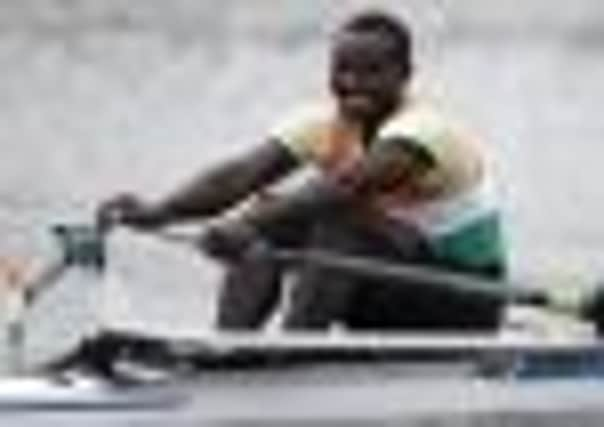London 2012 Olympics: Niger rower Djibo sets sights on Rio


The 35-year-old has won near-cult status with the mostly British crowd in his three races so far. Yesterday, the commentator urged him on as he lagged the field by 300 metres on the 2,000 metre course, and finished 28 seconds slower than in his previous race.
Some 20,000 spectators rose to their feet to cheer him over the finish, where he slumped over his oars and gasped for breath.
Advertisement
Hide AdAdvertisement
Hide AdDubbed the “sculling sloth”, he received a wild card to the Olympics under a system designed to ensure all 204 National Olympic Committees can take part, even if no athletes have qualified. He rowed first in a traditional wooden fishing boat, before spending three months abroad on a training camp. The first time he sat in a narrow racing boat, he fell in.
“I don’t have any technique,” the slight figure told reporters. “I’ve been learning only three months. But with the time and the years, I’ll get the technique,” he said, already setting his sights on the Rio Games in 2016.
“When I was on the starting line, I was just glad that I didn’t make the boat fall over,” he added. “I am very happy about that. And when I was finishing it really wasn’t easy. But there are lots of people who have encouraged me, and I needed a lot of courage to finish the race.”
Djibo Issaka has drawn comparisons with Eric ‘The Eel’ Moussambani, the swimmer from Equatorial Guinea who crawled to fame at Sydney in 2000.
He said he hoped people back home in his landlocked west African country had seen him on television, because that might encourage others to take up the sport. “At the moment we don’t have any boats, but maybe .... Inshallah (God willing) ... we might,” he said, shivering in his thin lycra suit.
The west African nation of Niger, which has sent six athletes to London, is landlocked and 80 per cent desert. Ahmadou Youssoufou, president of the country’s water sports federation, said: “In the next Olympiad, in the next Games, Hamadou will be stronger and faster. We don’t have any boats. No boats. We are getting two single sculls and two double sculls and some oars. They are coming in the next month so we can begin this sport in our country with the equipment.”
His countryman’s performance has spurred debate over whether the inclusion of novice rowers at the Olympics is the best way to promote the sport. But Matt Smith, executive director of the body overseeing international rowing, said: “We’re really proud of Hamadou and what he has caused for the development of rowing in his country.”
Sir Steve Redgrave, Britain’s most successful Olympian with five gold medals in rowing from consecutive Games, said the inclusion of rowers like Djibo Issaka was designed to promote the sport in countries not traditionally associated with it. But he accepted that there were limitations. “I hate to say it but it’s quite a lavish sport and you go to some of these African countries - I’ve been to schools in Africa - and their biggest issue there is water. They’re carrying water from a well and there I am showing them a 2,000 metre lake with people rowing up and down it. They haven’t seen anything like it.”
Djibo Issaka will compete again in the F final on Friday,
lining up alongside rowers from Cameroon and Tunisia.
Advertisement
Hide AdAdvertisement
Hide Ad• The four British crews in action at Eton Dorney yesterday qualified for the next round of their events, so all 13 British boats remain in the medal hunt.
The women’s eight, with Edinburgh’s Lindsey Maguire on board, had the toughest task, but they stayed ahead of Germany all the way to finish fourth in their repechage and grab the last place in tomorrow’s final line-up behind race winners Netherlands, Romania and Australia.
The rowing regatta moves onto the medal races today and three British crews will be racing in finals – the women’s pair of Lossiemouth’s Heather Stanning and her partner Helen Glover, who start as favourites; the men’s eight; and the women’s quad.